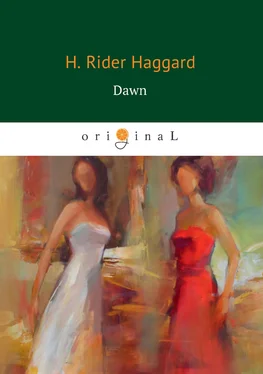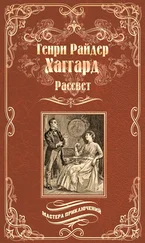At college Philip did fairly well, and, being a Caresfoot, did not run into debt. He was, as his great bodily strength gave promise of, a first-class athlete, and for two years stroked the Magdalen boat. Nor did he altogether neglect his books, but his reading was of a desultory and out-of-the-way order, and much directed towards the investigation of mystical subjects. Fairly well liked amongst the men with whom he mixed, he could hardly be called popular; his temperament was too uncertain for that. At times he was the gayest of the gay, and then when the fit took him he would be plunged into a state of gloomy depression that might last for days. His companions, to whom his mystical studies were a favourite jest, were wont to assert that on these occasions he was preparing for a visit from his familiar, but the joke was one that he never could be prevailed upon to appreciate. The fact of the matter was that these fits of gloom were constitutional with him, and very possibly had their origin in the state of his mother’s mind before his birth, when her whole thoughts were coloured by her morbid and fanciful terror of her husband, and her frantic anxiety to conciliate him.
During the three years that he spent at college, Philip saw but little of George, since, when he happened to be down at Bratham, which was not often, for he spent most of his vacations abroad, George avoided coming there as much as possible. Indeed, there was a tacit agreement between the two young men that they would see as little of each other as might be convenient. But, though he did not see much of him himself, Philip was none the less aware that George’s influence over his father was, if anything, on the increase. The old squire’s letters were full of him and of the admirable way in which he managed the estate, for it was now practically in his hands. Indeed, to his surprise and somewhat to his disgust, he found that George began to be spoken of indifferently with himself as the "young squire.” Long before his college days had come to an end Philip had determined that he would do his best, as soon as opportunity offered, to reduce his cousin to his proper place, not by the violent means to which he had resorted in other days, but rather by showing himself to be equally capable, equally assiduous, and equally respectful and affectionate.
At last the day came when he was to bid farewell to Oxford for good, and in due course he found himself in a second-class railway carriage— thinking it useless to waste money, he always went second—and bound for Roxham.
Just before the train left the platform at Paddington, Philip was agreeably surprised out of his meditations by the entry into his carriage of an extremely elegant and stately young lady, a foreigner as he judged from her strong accent when she addressed the porter. With the innate gallantry of twenty-one, he immediately laid himself out to make the acquaintance of one possessed of such proud, yet melting blue eyes, such lovely hair, and a figure that would not have disgraced Diana; and, with this view, set himself to render her such little services as one fellow-traveller can offer to another. They were accepted reservedly at first, then gratefully, and before long the reserve broke down entirely, and this very handsome pair dropped into a conversation as animated as the lady’s broken English would allow. The lady told him that her name was Hilda von Holtzhausen, that she was of a German family, and had come to England to enter a family as companion, in order to obtain a perfect knowledge of the English language. She had already been to France and acquired French; when she knew English, then she had been promised a place as school- mistress under government in her own country. Her father and mother were dead, and she had no brothers or sisters, and very few friends.
Where was she going to? She was going to a place called Roxham; here it was written on the ticket. She was going to be companion to a dear young lady, very rich, like all the English, whom she had met when she had travelled with her French family to Jersey, a Miss Lee.
"You don’t say so!” said Philip. "Has she come back to Rewtham?”
"What, do you, then, know her?”
"Yes—that is, I used to three years ago. I live in the next parish.”
"Ah! then perhaps you are the gentleman of whom I have heard her to speak, Mr. Car-es-foot, whom she did seem to appear to love; is not that the word?—to be very fond, you know.”
Philip laughed, blushed, and acknowledged his identity with the gentleman whom Miss Lee "did seem to appear to love.”
"Oh! I am glad; then we shall be friends, and see each other often —shall we not?”
He declared unreservedly that she should see him very often.
From Fraulein von Holtzhausen Philip gathered in the course of their journey a good many particulars about Miss Lee. It appeared that, having attained her majority, she was coming back to live at her old home at Rewtham, whither she had tried to persuade her Aunt Chambers to accompany her, but without success, that lady being too much attached to Jersey to leave it. During the course of a long stay on the island, the two girls had become fast friends, and the friendship had culminated in an offer being made by Maria Lee to Fraulein von Holtzhausen to come and live with her as a companion, a proposal that exactly suited the latter.
The mention of Miss Lee’s name had awakened pleasant recollections in Philip’s mind, recollections that, at any other time, might have tended towards the sentimental; but, when under fire from the blue eyes of this stately foreigner, it was impossible for him to feel sentimental about anybody save herself. "The journey is over all too soon,” was the secret thought of each as they stepped on to the Roxham platform. Before they had finally said good-bye, however, a young lady with a dainty figure, in a shady hat and pink and white dress, came running along the platform.
"Hilda, Hilda, here I am! How do you do, dear? Welcome home,” and she was about to seal her welcome with a kiss, when her eye fell upon Philip standing by.
"Oh, Philip!” she cried with a blush, "don’t you know me? Have I changed much? I should have known you anywhere; and I am glad to see you, awfully glad (excuse the slang, but it is such a relief to be able to say ‘awful’ without being pulled up by Aunt Chambers). Just think, it is three years since we met. Do you remember Grumps? How do I look? Do you think you will like me as much as you used to?”
"I think that you are looking the same dear girl that you always used to look, only you have grown very pretty, and it is not possible that I shall like you more than I used to.”
"I think they must teach you to pay compliments at Oxford, Philip,” she answered, flushing with pleasure, "but it is all rubbish for you to say that I am pretty, because I know I am not”—and then, confidentially, glancing round to see that there was nobody within hearing (Hilda was engaged with a porter in looking after her things): "Just look at my nose, and you will soon change your mind. It’s broader, and flatter, and snubbier than ever. I consider that I have got a bone to pick with Providence about that nose. Ah! here comes Hilda. Isn’t she lovely! There’s beauty for you if you like. She hasn’t got a nose. Come and show us to the carriage. You will come and lunch with us to- morrow, won’t you? I am so glad to get back to the old house again; and I mean to have such a garden! ‘Life is short, and joys are fleeting,’ as Aunt Chambers always says, so I mean to make the best of it whilst it lasts. I saw your father yesterday. He is a dear old man, though he has such awful eyes. I never felt so happy in my life as I do now. Good-bye. One o’clock.” And she was gone, leaving Philip with something to think about.
Philip’s reception at home was cordial and reassuring. He found his father considerably aged in appearance, but as handsome and upright as ever, and to all appearance heartily glad to see him.
Читать дальше












